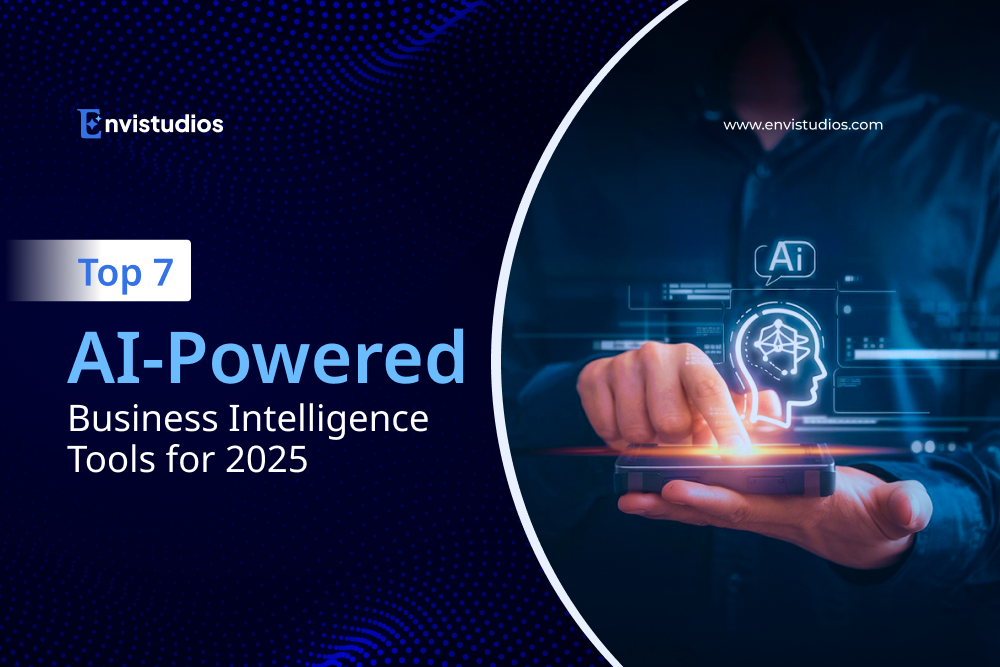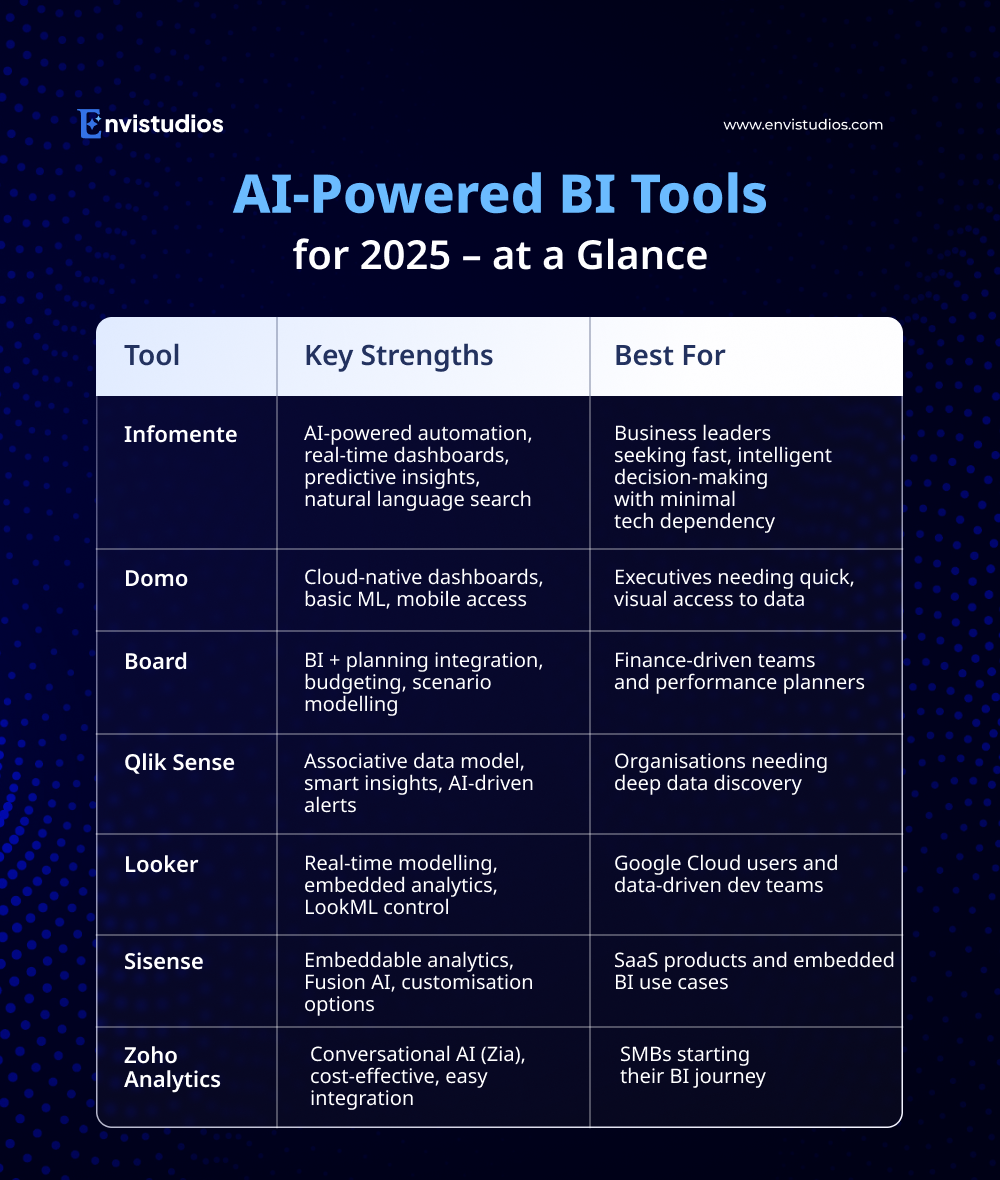AI-Powered Best Business Intelligence Tools 2025 for Business Leaders
Top 7 Best Business Intelligence Tools for 2025: Featuring AI-Powered Insights
Dipiya Jain
-
Sep 15, 2025
-
5:30 min read

In today’s data-driven economy, selecting the best business intelligence software is a strategic necessity. As organisations continue to embrace digital transformation, the ability to convert raw data into real-time, actionable insights becomes a major competitive advantage.
As data grows, so does the need for tools that can interpret and visualise it meaningfully, powered by AI, automation, and real-time analytics.
This blog highlights the top 7 BI Tools in 2025 that are helping leaders stay ahead of the curve through smart, AI-enabled decision-making.
I. Leading BI Tools in 2025
1. Infomente
Infomente takes the lead as one of the most advanced yet Best Business Intelligence Tools available today. With a strong foundation in AI-powered automation, Infomente delivers deep insights through real-time dashboards, predictive analytics, and smart alerts—all in one sleek, cloud-first platform
Why It Stands Out:
-
Offers natural language search for instant answers
-
Detects patterns and anomalies using AI algorithms
-
Connects easily to multiple data sources
Built with business users in mind, Infomente reduces dependency on technical teams and helps CEOs and stakeholders get the answers they need—fast and with full clarity.
2. Domo
Domo is a cloud-native platform designed to centralise business data and visualise it through user-friendly dashboards. While it may not offer the depth of AI analytics that top-tier tools like Infomente do, Domo performs well for executives needing simplified visibility across departments.
Key Capabilities:
-
Pre-built dashboard templates
-
Easy mobile access for on-the-go monitoring
-
Basic machine learning models and data alerts
Its strength lies in usability for business teams rather than technical sophistication.
3. Board
Board offers an all-in-one solution that combines business intelligence, planning, and performance management. It’s especially useful for finance teams and organisations looking to unify planning with data visualisation.
Why It Works:
-
Built-in financial forecasting and budgeting tools
-
Decision-making workflows and simulation modelling
-
Basic AI suggestions through automation and scenario analysis
While not as advanced in AI capabilities as other tools, Board serves well in finance-heavy or planning-centric environments.
4. Qlik Sense
Qlik Sense offers an intuitive platform built around its unique associative data model, helping users discover connections across large and complex datasets. Its AI features are embedded throughout, making insights accessible and contextual.
Core Features:
-
Auto-generated insights and visualisations
-
Natural language interaction through Insight Advisor
-
AI-driven data alerts and recommendations
It is interesting to note that Gen AI-based tools are transforming BI from reactive reporting to proactive, real-time intelligence, enabling organisations to anticipate trends and act quickly.
5. Looker
Looker, part of the Google Cloud ecosystem, focuses on real-time data modelling and embedded analytics. Designed for the cloud, it allows for seamless integration with Google BigQuery and other modern data warehouses.
Best For:
-
Businesses working with real-time data pipelines
-
Companies using Google Workspace or Google Cloud
-
Developers building custom analytics apps
Its modelling layer, LookML, gives teams more control over how data is structured and analysed.
6. Sisense
Sisense helps companies embed analytics into internal tools, customer portals, or SaaS products. It’s ideal for product-oriented businesses looking to monetise data or enhance user experiences.
Key Highlights:
-
Embeddable analytics using JavaScript and APIs
-
Fusion AI engine for predictive modelling
-
Suitable for both technical and non-technical users
Sisense supports a modular approach, making it flexible for teams with varying skill sets.
7. Zoho Analytics
For small and mid-sized businesses, Zoho Analytics delivers strong analytics capabilities without breaking the bank. It fits perfectly into the Zoho suite but also integrates with other platforms like Salesforce, Shopify, and Google Ads.
Standout Features:
-
AI assistant (Zia) for conversational analysis
-
Pre-built data connectors and dashboards
-
Scheduled reports and smart alerts
It’s an ideal entry point for companies beginning their BI journey in 2025.

II. Why These Are the Best Business Intelligence Tools for 2025
The Best Business Intelligence Software blends ease of use, powerful AI features, and seamless data integration. These tools allow business leaders to focus on strategic decisions instead of wrestling with spreadsheets or waiting for analysts.
From Infomente’s advanced automation to Board’s integrated planning capabilities, each tool on this list is built to simplify data interpretation and support strategic decisions. For leaders focused on improving forecasting, tracking performance, or unlocking growth opportunities, these are the best business intelligence tools to explore in 2025.
Conclusion
In 2025, business intelligence is no longer just about generating reports; it’s about agility, foresight, and intelligent execution. Choosing the best business intelligence software empowers CEOs and business owners to harness data more effectively, drive operational efficiency, and lead with confidence.
Envistudios helps businesses implement and maximise the value of modern BI platforms, especially Infomente. With tailored solutions and expert support, Envistudios ensures a seamless BI journey that delivers clarity, speed, and measurable business impact.


